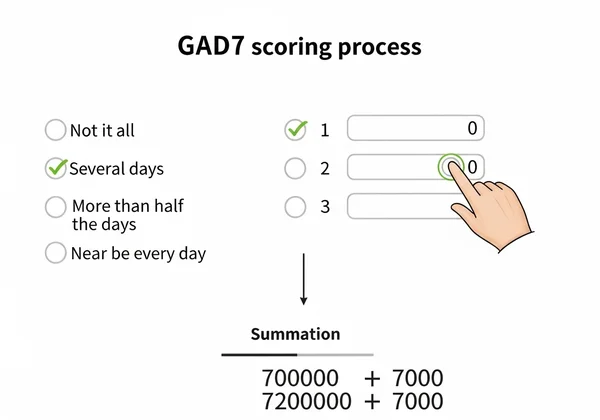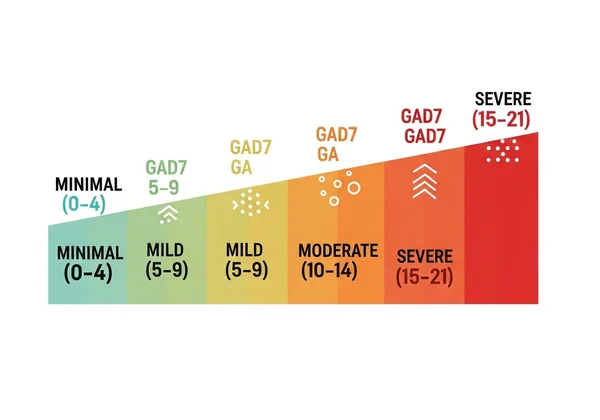GAD7 Score Interpretation: Understand Your Anxiety Results
July 13, 2025 | By Fiona Hayes
Have you recently taken a GAD7 assessment and are wondering what does my GAD7 score mean? Embarking on the journey to understand your mental well-being can feel profound. This comprehensive guide will walk you through the nuances of your score, from minimal to severe anxiety, helping you gain clarity and confidence in understanding your current state. Whether you’ve just completed an assessment or are considering one, this article provides the insights you need. If you're ready to get your GAD7 score and understand its meaning, our platform offers a quick, confidential, and scientifically validated tool.

How GAD7 Scoring Works
The Generalized Anxiety Disorder 7-item scale, or GAD7, is a widely used and scientifically validated screening tool designed to assess the severity of generalized anxiety symptoms. It was developed by Spitzer and colleagues, providing a reliable measure of anxiety over the past two weeks. Understanding how this scoring works is the first step toward interpreting your results.
The Seven Questions: What Do They Measure?
The questionnaire asks seven specific questions about how often you've been bothered by certain symptoms over the last two weeks. These questions cover key indicators of generalized anxiety, such as:
- Feeling nervous, anxious, or on edge.
- Not being able to stop or control worrying.
- Worrying too much about different things.
- Trouble relaxing.
- Being so restless that it's hard to sit still.
- Becoming easily annoyed or irritable.
- Feeling afraid as if something awful might happen.
Each question focuses on a different aspect of generalized anxiety symptoms, ranging from cognitive (worry) to physical (restlessness, irritability). By answering honestly, you provide a snapshot of your recent emotional experience.
Calculating Your GAD7 Score: A Simple Guide
Calculating your score is straightforward. For each of the seven questions, you select an answer based on frequency:
- 0 for "Not at all"
- 1 for "Several days"
- 2 for "More than half the days"
- 3 for "Nearly every day"
Your score is the sum of the points from all seven questions. This means your total score can range from 0 to 21. A higher score indicates more frequent and/or severe anxiety symptoms. This simple tally provides a quantifiable measure of your current anxiety levels, offering an objective starting point for self-reflection.

Understanding Your GAD7 Score Ranges
Once you have your total score, the next crucial step is understanding your GAD7 score ranges. These ranges provide a guideline for interpreting the severity of your anxiety symptoms. Remember, these are guidelines, and personal experiences can vary.
Scores 0-4: Minimal or No Anxiety Symptoms
A score in this range suggests that you are experiencing minimal or no anxiety symptoms. This is generally considered a healthy range, indicating that you are managing daily stressors effectively and are not significantly bothered by generalized anxiety. While this score is reassuring, it doesn't mean you won't experience anxiety at all, as anxiety is a normal human emotion. It simply implies that your current level of anxiety isn't significantly impacting your life. Continue practicing healthy coping strategies and mindfulness to maintain your mental well-being.
Scores 5-9: Mild Anxiety
If your score falls between 5 and 9, you are likely experiencing mild anxiety. At this level, you might notice some anxiety symptoms, but they are generally manageable and may not severely disrupt your daily life. You might find yourself worrying more often than usual or feeling a bit more irritable or restless. This is an opportune moment for self-awareness and implementing simple anxiety management techniques. Consider exploring relaxation exercises, mindfulness, or discussing your feelings with a trusted friend or family member. Recognizing mild anxiety early can prevent it from escalating.

Scores 10-14: Moderate Anxiety
A score of 10 to 14 indicates moderate anxiety. At this stage, your anxiety symptoms are more noticeable and might be having a noticeable impact on your daily functioning, work, relationships, or overall quality of life. You might find it harder to control your worries, experience more physical symptoms like restlessness or trouble sleeping, and feel frequently on edge. This range suggests it could be beneficial to explore support options. Consider speaking with a doctor or a mental health professional who can offer guidance and discuss potential coping strategies. Proactive steps at this level can significantly improve your well-being.
Scores 15-21: Severe Anxiety
A score between 15 and 21 suggests severe anxiety. This level indicates that anxiety symptoms are highly prominent and likely causing significant distress and impairment in various aspects of your life. You might find it extremely difficult to control worrying, experience persistent physical symptoms, and feel overwhelmed by your anxiety. If your score is in this range, it is strongly recommended that you seek professional help immediately. Mental health professionals can provide comprehensive assessments and develop an appropriate treatment plan to help you manage and alleviate your symptoms. Remember, seeking help is a courageous act, and support is readily available.
Beyond the Score: Important Considerations for Your GAD7 Results
Your GAD7 score provides valuable insight, but it's just one piece of the puzzle. Understanding its limitations and next steps is crucial for a complete picture of your mental health.
GAD7: A Screening Tool, Not a Diagnosis
It's vital to remember that the GAD7 is a screening tool, not a diagnosis. While a higher score indicates a greater likelihood of generalized anxiety disorder, only a qualified healthcare professional can make an official diagnosis. This tool is designed to identify individuals who may benefit from further evaluation. It's a stepping stone, a way to understand your results and open a dialogue with professionals if needed. This distinction is crucial for maintaining accurate and trustworthy information in mental health self-assessments.
What to Do After Getting Your GAD7 Score
What should I do after getting my GAD7 score? Your score offers valuable insight into your current anxiety levels, but it's the actions you take next that truly matter.
-
Reflect on Your Results: Consider how your score aligns with your personal experiences. Does it confirm what you've been feeling?
-
Seek Professional Guidance (If Indicated): If your score is in the moderate to severe range, or if you feel distressed regardless of your score, reach out to a doctor, therapist, or counselor. They can conduct a full assessment and discuss appropriate interventions.
-
Explore Self-Help Strategies: For mild anxiety, or as a complement to professional treatment, explore practices like mindfulness meditation, deep breathing exercises, regular physical activity, and a balanced diet.
-
Utilize Personalized Insights: Here, beyond your instant score interpretation, you have the option to receive a unique AI-powered personalized report. This report goes deeper, offering personalized insights into your strengths, potential challenges, and actionable steps tailored to your specific responses. It’s an invaluable resource for gaining a more comprehensive understanding of your anxiety and mapping out a path forward. We encourage you to explore the tool and consider this enhanced analysis.

Your GAD7 Score: A Step Towards Understanding & Action
Understanding your score interpretation is a powerful step in taking charge of your mental well-being. This widely used assessment provides a clear snapshot of your current anxiety symptoms, offering a benchmark from minimal to severe. It’s a confidential and accessible way to gain clarity, whether for your own peace of mind or as preparation for a conversation with a healthcare provider.
Remember, the GAD7 is a screening tool designed to empower you with information, not to diagnose. Your score is a starting point for further self-reflection and, if necessary, for seeking professional support. Our platform is committed to providing you with a reliable, private, and insightful tool for your anxiety self-assessment. Take the first step towards understanding your anxiety better today. Start your GAD7 assessment on our website and discover not only your score but also the option for a personalized AI-driven report to guide your journey. Your mental health matters, and we are here to support you.
Frequently Asked Questions About GAD7 Scores
What does my GAD7 score mean?
Your GAD7 score indicates the severity of your generalized anxiety symptoms over the past two weeks. Scores range from 0 to 21, with higher scores suggesting more frequent and impacting symptoms. It helps you understand if your current feelings align with minimal, mild, moderate, or severe anxiety levels.
How to score the GAD7?
To score the GAD7, you assign points to your answer for each of the seven questions: 0 points for "Not at all," 1 for "Several days," 2 for "More than half the days," and 3 for "Nearly every day." Summing these points gives you your total GAD7 score, ranging from 0 to 21. Our online GAD7 assessment automatically calculates this for you.
What are the GAD7 score ranges for mild, moderate, severe anxiety?
The commonly accepted GAD7 score ranges are:
- 0-4: Minimal or no anxiety symptoms.
- 5-9: Mild anxiety.
- 10-14: Moderate anxiety.
- 15-21: Severe anxiety. These ranges are clinical guidelines to help interpret your results.
Is the GAD7 a diagnosis?
No, the GAD7 is a screening tool, not a diagnosis. It helps identify individuals who might be experiencing symptoms consistent with generalized anxiety and could benefit from further evaluation. Only a qualified healthcare professional, such as a doctor or therapist, can provide an official diagnosis.
What should I do after getting my GAD7 score?
After getting your score, reflect on what it means for you. If your score indicates moderate or severe anxiety, or if you feel distressed, it's advisable to speak with a healthcare professional. For any score, consider exploring self-help strategies like mindfulness. You can also opt for GAD7.org's unique AI personalized report for deeper insights and actionable steps by taking the GAD7 anxiety test on our homepage.